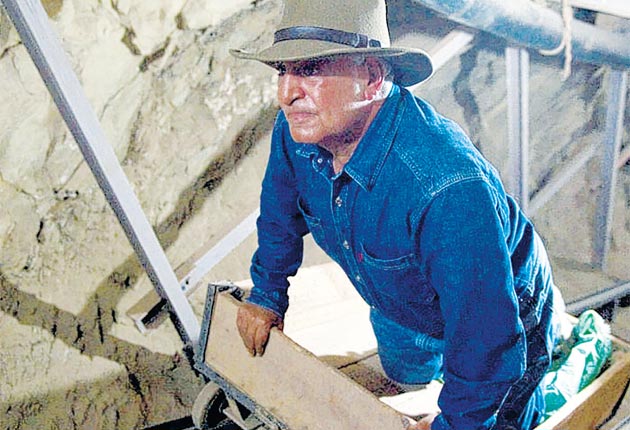Egypt's 'Indiana Jones' to quit over looting of ancient sites
Antiquities minister accuses new regime of failing to protect country's rich heritage

Your support helps us to tell the story
From reproductive rights to climate change to Big Tech, The Independent is on the ground when the story is developing. Whether it's investigating the financials of Elon Musk's pro-Trump PAC or producing our latest documentary, 'The A Word', which shines a light on the American women fighting for reproductive rights, we know how important it is to parse out the facts from the messaging.
At such a critical moment in US history, we need reporters on the ground. Your donation allows us to keep sending journalists to speak to both sides of the story.
The Independent is trusted by Americans across the entire political spectrum. And unlike many other quality news outlets, we choose not to lock Americans out of our reporting and analysis with paywalls. We believe quality journalism should be available to everyone, paid for by those who can afford it.
Your support makes all the difference.The archaeologist who styles himself as Egypt's Indiana Jones, battling to save the nation's rich heritage, has said he will resign as antiquities minister, complaining that treasures are being looted and ravaged with little protection from the authorities.
Dr Zahi Hawass, who has come under fire for his links to the ousted president, Hosni Mubarak, said the country's antiquities were in "grave danger" from criminals, with the new military regime that took power last month failing to preserve law and order.
"Since Mubarak's resignation, looting has increased all over the country, and our antiquities are in grave danger from criminals trying to take advantage of the situation," he wrote on his website, going on to list dozens of archaeological sites across the country raided since Mubarak's ouster on 11 February.
Egyptian newspapers yesterday widely quoted the fedora-wearing TV personality saying he was not willing to participate in the government of Essam Sharaf, named as the new Prime Minister by the military on Thursday, after the Mubarak-appointed Ahmed Shafiq resigned.
Dr Hawass told the Al-Masry-Al-Youm newspaper: "I will not return to the ministry again. During my life, I have never felt weak until the period which I assumed my position in the Ministry of Antiquities."
His statements appear to contradict an interview with The Independent last month, when he insisted Egypt was fully able to look after its treasures, which include the tombs in the Valley of the Kings, the pyramids of Giza and the Pharaonic treasures at the Egyptian Museum in Cairo. Sitting in his government office on the plush residential island of Zamalek in the Nile two weeks ago, he insisted: "The world should salute what these people did and come to Tahrir Square to thank them for saving the museum."
He said the government had coped admirably in protecting its museums and ancient sites during the 18-day uprising, when tens of thousands of people gathered in Cairo's Tahrir Square to call for an end to Mr Mubarak's long autocratic rule. Dr Hawass even touted the idea of a museum to honour the uprising. He also took aim at suggestions that the upheaval may have dealt a blow to his campaign to repatriate Egyptian artefacts being kept in Britain. He said that if there had been a revolution in the UK, "not one single thing would have been left in the British Museum".
The uprising brought widespread looting and vandalism. At the Egyptian Museum in Tahrir Square, 18 artefacts were reported missing, including two statues of the boy king Tutankhamun. Four have been found. Thieves also targeted the ancient burial ground of Sakkara. Egypt's tourist sites reopened last month, but holidaymakers are staying away.
A crime wave has also hit some parts of the country, with the police, widely reviled as tools of Mubarak, disappearing from the streets after the revolution. Some returned after the army stepped in to maintain law and order, but security remains fragile.
"The antiquities guards and security forces at sites are unarmed and this makes them easy targets for armed looters," Dr Hawass wrote on his website this week. "In addition, the Egyptian police force does not have the capacity to protect every single site, monument and museum in Egypt."
Dr Hawass had come under fire for his links to Mubarak. He was named Minister of Antiquities during the deposed president's desperate cabinet reshuffle on 31 January, a last futile effort to cling on to power. He was also the target of a protest last month by about 200 archaeologists who gathered outside his office to demand employment.
With his fedora hat and desert fatigues, Dr Hawass has cast himself in the mould of an Indiana Jones-style figure, but his brusque, steamroller style has not always won him admirers. The one thing his staff members agree on is that he is a seven-day-week workaholic; others have said his countless magazine, book and documentary appearances are calculated to promote himself as much as his science.
Such is the profile of the headline-hogging archaeologist, some in the blogosphere had even touted Dr Hawass as a future leader. But they look set to be disappointed. "I'm not a politician," he said gruffly when asked last month about his leadership ambitions. "I'm a technician. Don't ask me about politics. I rule it out completely."
Join our commenting forum
Join thought-provoking conversations, follow other Independent readers and see their replies
0Comments